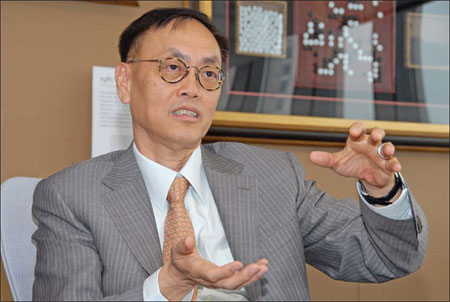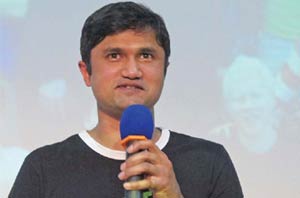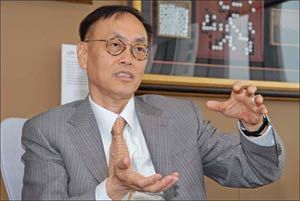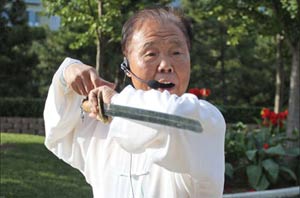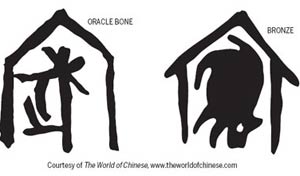The China strategist
Updated: 2011-10-07 10:19
By Andrew Moody (China Daily)
|
|||||||||
|
|
Nation should be at the core of any global company's business strategy, top consultant says
America's leading companies are still streets ahead of their Chinese counterparts - and this should be of more vital concern to China than whether it overtakes the United States as the world's biggest economy over the next decade.
|
||||
"American enterprises are strong. The most successful such as Apple, Microsoft and Hewlett-Packard are bona fide businesses. They are very innovative and they have found a way to create a business model that works," he says.
Tse, who was in the boardroom of his company's offices in SK Tower on Jianguomenwai Avenue in Beijing, says such success did not come out of nowhere and it was something China had to learn from.
"These companies don't come out of a vacuum. They come out of the fact that the US has allowed entrepreneurialism and innovation to develop and also from the successes of their higher educational system. This is the so-called soft power with which America has a lead," he says.
Tse, who is regarded as one of China's leading business thinkers and is author of the internationally best-selling The China Strategy, says it is a diversion to think that China becoming the world's largest economy on its own is a significant event.
"There has been a lot of discussion about that. In my view it really doesn't matter whether China is No 1 in terms of size or America is. Both countries are going to be large, dominant and pretty powerful anyway so it doesn't really matter," he says.
Tse, a lithe figure who has the air almost of a high priest, believes China's response to events such as the July crash between two high-speed trains at Wenzhou in Zhejiang province, which killed 40 people, could prove a key indicator in assessing whether the country has advanced.
"This accident gives people a real situation to examine whether all the reported progress we have made in the last three, five or 10 years, particularly in the technology area, is real or not," he says. "Have we been truly making progress or have we been pretending that we have?"
Tse works from his company's offices in Hong Kong, Shanghai and Beijing and divides his time between homes in the Special Administrative Region and Shanghai.
"I tend to spend two-thirds of the weekend in Hong Kong and one-third in Shanghai. My daughter lives in Shanghai and my wife in Hong Kong."
Tse says there is still a contrast between the two cities, despite Hong Kong having been returned back to China more than 14 years ago.
"Hong Kong still bears the imprint of the British system and people in Hong Kong are still generally more international in their outlook than people on the mainland. I think that is the result of China being closed to the outside world from 1949 until 1992," he says.
Tse's recent China-strategy book was seen as a wake-up call for many firms doing business with China.
He argued that many foreign companies still thought China was a place where there are a billion customers to be found overnight and where cheap goods can be sourced.
"China is not just about a market. It is not about a sourcing base. China actually needs to be right at the core of any company's global strategy," he says.
Tse says many companies continue to fail because they think what works globally can be merely replicated in China.
"Companies make many different mistakes but one of the most consistent themes is when companies naively take whatever product or service they sell in other parts of the world, plug it into China and expect it to work right away. In almost all cases it doesn't work," he says.
Tse argues that companies now often have to go much further and develop a deep understanding of the market.
This could involve setting up research and development bases in the country to devise products or services that neatly fit the China market.
"In the past companies just used to take what products the global R&D base came up with in Germany or America and then try and sell them in China.
"Sometimes it works, sometimes it doesn't but increasingly companies need to develop R&D capabilities here because you really have to understand the customers' needs and produce products and services for them in a very responsive way."
Tse currently sits on the editorial board of the Harvard Business Review and last year wrote an article for the magazine posing the question whether it is now too late for companies to enter China.
"My view is that even if you are not in China today, if you want to open here, there is always an opportunity. You have, however, to be really prepared to do it and also know what you are doing," he says.
He says it is Chinese companies that often make the biggest mistakes when expanding overseas, the classic case being China TV maker TCL making big losses from European acquisitions.
"I think Chinese companies going overseas produces even worse cultural clashes than when foreign companies come to China. I don't think the Chinese are quite prepared to deal with foreign cultures; with certain exceptions, of course."
Tse says he is not worried that China is heading for an investment bust as some economists have forecast as a result of the economy being weighed down by the high levels of local government debt reported earlier this year.
Some say the Chinese government's 4 trillion yuan (464 billion euros, $627 billion) stimulus package following the financial crisis has led to over investment and unnecessary infrastructure building.
"Over the past 20 years there have been many periods where there has been overcapacity but over time it has been absorbed since China has continued to grow in a reasonably fast way," he says.
He believes the biggest challenge for the Chinese economy remains making the transition from being an exporter of cheap manufactured goods to a consumer society making high-end goods and services.
"We can talk about inflation and increases in labor costs and obviously they are legitimate concerns. These kind of things can be managed away, however," he says.
"The most critical challenge is the structural shift from the low-cost export model to producing more value added goods and to be more innovation-driven."
